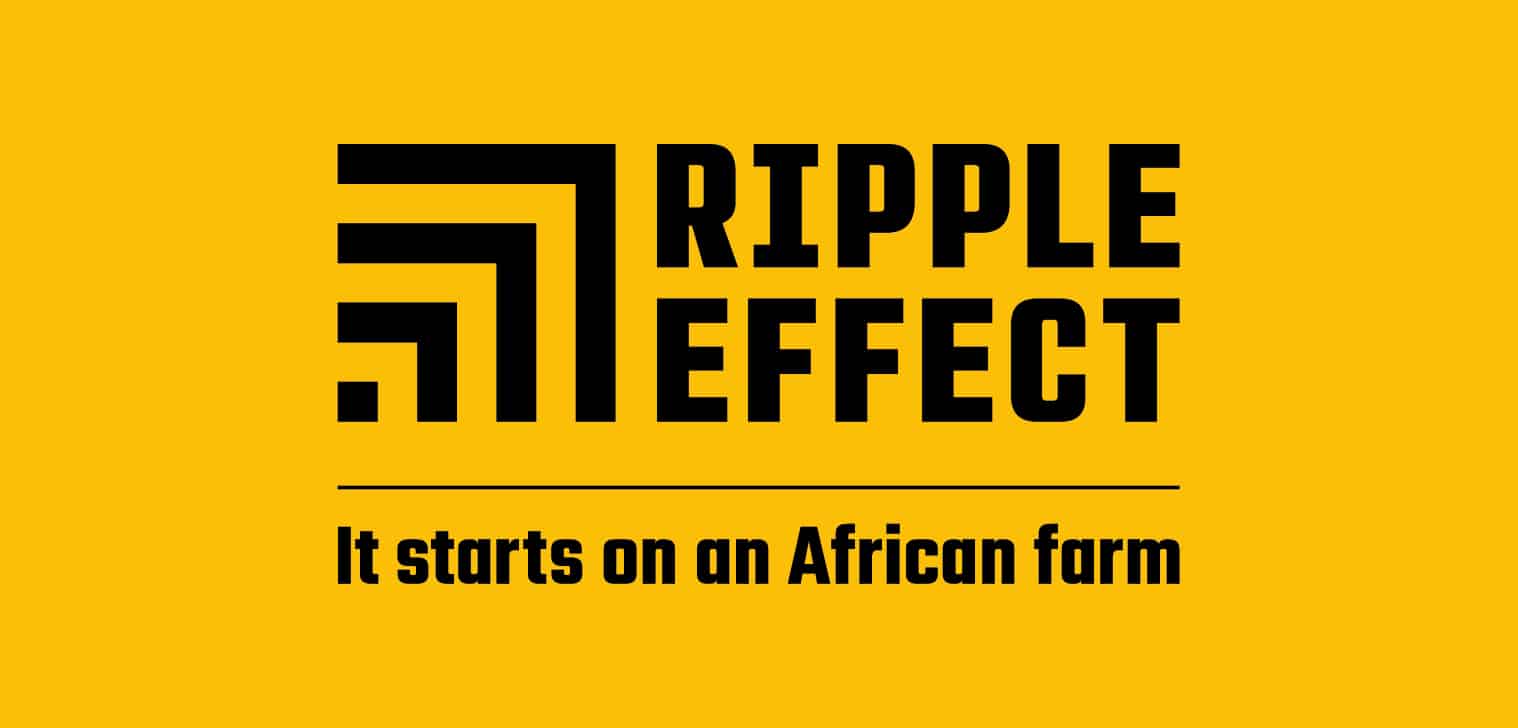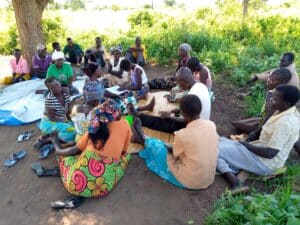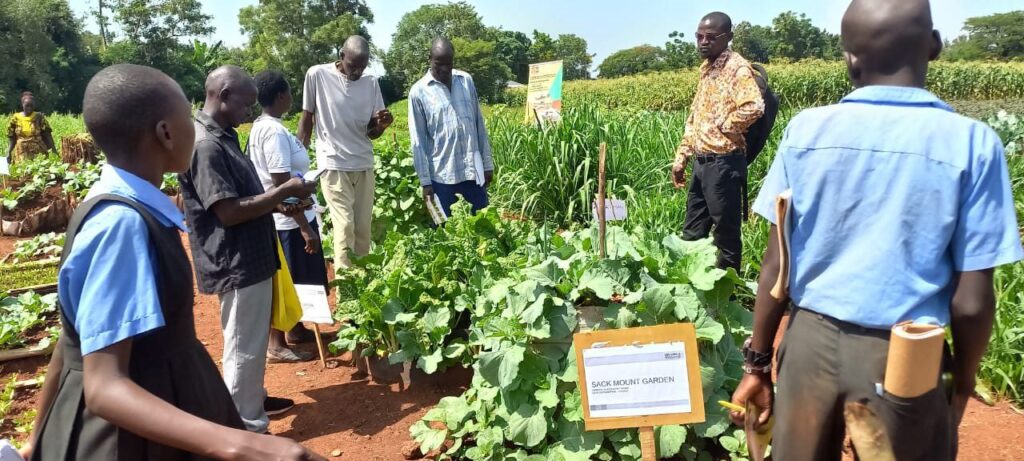
RIPPLE EFFECT
Ripple Effect has been working with farming communities across East and Southern Africa since 1988. Farmers working alongside Ripple Effect learn more, grow more and sell more. They can feed their families nutritious food, and by having a surplus to sell they can invest in their farms, send their children to school and build sustainable agri-businesses.
Ripple Effect focuses on three areas:
Sustainable agriculture
It trains famers to adopt sustainable agroecological farming practices which have a climate-positive impact and can make their land an asset for building food security and financial resilience.
Gender and social inclusion
It has a diverse network that advocates for the inclusion of groups that have been marginalised so that these groups can be heard, have influence in their communities and meaningfully participate in economic activities. It is bringing more young people and women into its work.
Enterprise development and innovation
Once farmers are food secure, Ripple Effect encourages them to develop and grow their farm as a business so they can generate more income and have greater control over their future.
The business model
Ripple Effect has always had a traditional grant model, working with institutional funders and trusts and foundations. Over the last few years this approach has become more challenging, not just because of increased competition for funding and changing funder priorities, but because funders have placed unreasonable expectations on grant recipients. To survive, Ripple Effect knew it needed to make a change.

The leadership team realised there were lots of opportunities open to Ripple Effect due to its background in sustainable agriculture. They started to embed a more entrepreneurial mindset in the organisation in an attempt to drive sustainability. Initially, they investigated whether they could set up a development impact bond as they liked the focus it would have bought on measuring impact, innovation, learning and scaling up. However, they found the set-up costs and ongoing management would be too much for their size of organisation. They decided they would only consider exploring this further if they had the support of a significant lead outcome funder.
They went back to the drawing board, and realised that their expertise in agriculture meant there were other ways to generate income. It’s still early days, but the organisation is now developing two new models:
1. Peer farmer trainers
Ripple Effect adapted its traditional grant-funded programme, in which community farmers were trained up and volunteered their time, to a paid-for service that generates an income for farmers. It is a common misconception that people with limited economic resources are unwilling to pay for services, as most smallholder farmers in Africa pay commercial operators for specialist agricultural services. This approach uses the market to deliver farming methods to communities in a sustainable way.
A peer farmer trainer is a farmer who is selected by Ripple Effect to receive additional agricultural training, such as training on soil fertility building, vegetable growing in the homestead, soil and water conservation or tree planting. This is especially helpful in communities where an urgent agricultural need has been identified. For example, in Kenya and Uganda, peer farmer trainers manage a monthly poultry vaccination programme for disease control management.
Ripple Effect is only at the beginning of this work. The hope is that this will become a fully-fledged social enterprise that will provide farmers with specialist training so they are able to go out and support their own communities with agriculture and food production. It is a paid-for service, whereby local farmers pay the peer farmers for their services, which Ripple Effect intends to scale up in the organisation.
2. The Biosafe Hub
Building on the entrepreneurial mindset that is beginning to embed within Ripple Effect, the organisation aspires to set up another social enterprise. This enterprise will promote and sell biosafe inputs with and to farmers, instead of chemical fertilisers.
This will be a hub that will bring together peer farmer trainers, private sector seed companies and educational establishments to champion biosafe methods, engage with stakeholders and scale up the approach. The organisation is at a very early stage with this project. It is currently developing a business case for its board, based on a pilot programme in Kenya. But the expectation is that eventually this will generate income for Ripple Effect.
How the organisation is hoping to do it
Ripple Effect is combing its expertise in agriculture, and its understanding of the market and what smallholder farmers need and want, to develop these new funding approaches. Ripple Effect has invested time in building relationships with the communities it works with; people from these communities are referred to as ‘participants’ not ‘beneficiaries’.
Ripple Effect directly trains and upskill farmers to become peer farmer trainers, rather than using a consultant who does not understand the context. It works with local people (peer farmers) who are connected to and are part of the communities Ripple Effect works with. This creates strong bonds and builds social capital with farmers and communities.

Ripple Effect supports the farmers as they develop their businesses, providing mentorship and the right linkages for them to succeed. The organisation trains farmers to build new skills when there are needed, such as vaccinations for poultry, and it provides starter kits with the necessary equipment. The peer farmer trainers offer a slightly cheaper rate than a commercial business for their services. They can undercut commercial businesses as they are already based in the communities and don’t need to travel to remote villages.
Ripple Effect will use its expertise and understanding of the market, combined with its relationships with private sector companies, to develop the Biosafe Hub. The organisation hopes this will become a fully scaled franchise model with distribution networks across regions. Through the peer framers Ripple Effect will encourage smallholder farmers to use biosafe rather than harmful chemicals, and in this way the peer farmers will become embedded into the Biosafe Hub. Peer farmer trainers will be given the opportunity to become distribution agents, and by doing so peer farmer trainers and biosafe products will be offered as a bundled service to farmers.
Why did the organisation decide to use this approach?
Ripple Effect found that it was getting increasingly difficult to motivate its farmers to volunteer. At the same time, it was also getting harder and more competitive to secure grant funding for this work. The organisation wanted to restore power and dignity to the communities it works with. Adapting the peer farmer trainer model to a market-based approach has generated income for farmers and their communities, and at the same time ensured the long-term sustainability of Ripple Effects’ work.
The Biosafe Hub will be a social enterprise. Ripple Effect has decided to use this approach to generate income that will contribute to sustaining the organisation while also promoting safer fertilisers and inputs for smallholder farmers.
How effective is this approach?
Generating income
The peer farmer trainer model is a social enterprise that is being piloted and is already generating income for farmers. There is demand for the peer farmers’ services, and the customer base is growing from word-of-mouth recommendations. Unlike the grant model, where farmers volunteered their time, Ripple Effect is not struggling to recruit peer farmers, instead farmers are coming to them and asking to be trained.
The Ripple Effect/peer farmer trainer brand is building, but as this social enterprise is still at an early stage it is difficult to know what the business will achieve. Ripple Effect hopes demand will continue to rise and the model can be turned into a scalable business. In the long term, Ripple Effects hopes it will generate enough income fso it can scale up in other countries and communities.
The Biosafe Hub is less developed as a project so it not yet generating income.
Supporting a shift to locally led development
Locally led development is integral to Ripple Effect. The organisation recently changed its name from Send a Cow to Ripple Effect because, as the organisation’s communications manager Jenny Stevenson explains, “‘sending’– donations, or expertise – isn’t sustainable, and it isn’t empowering”. Rather than giving grants, which are not sustainable, and maintain reliance on Ripple Effect, the peer famer trainer model uses market forces to sustain the programme and generate income for farmers.
The farmers feel valued, power is shifting, and they are being paid to deliver a service rather than being passive recipients of development. beauty of this approach is that people are being supported by farmers their community, rather than a contractor as they would be in the grant model. Ripple Effect’s approach restores dignity to farmers and their communities.
What has the organisation learnt and what challenges has it experienced/overcome?
Generating income can create tensions for INGOs
Ripple Effect is still at the start of its journey exploring income generation, and it has not been easy. There is always tension for a charity around income generation, and it is important for Ripple Effect to ensure it does not go against its values of serving people who cannot afford to pay for services. Ripple Effect has developed the following principles to help guide its discussions and decision making: Vision, mission and mandate: The success of alternative models will be judged on how far they advance Ripple Effect’s vision, are supportive of its mission and in line with its values. Being commercial in nature, alternative finance models must not risk the organisation’s charity status or reputation.
Inclusion and participation
Ripple Effect is committed to inclusive development and ensuring that people who have been marginalised, such as girls, women and people with disabilities, can participate in development and benefit equally. The organisation will ensure its programmes are broad and cater for everyone, including those who are unable to pay.
Trust and transparency
The organisation commits to being open and creating understanding with communities, its supporters and partners about the purpose, processes and operations of its alternative models. Adequate systems should be in place to ensure transparency with communities and supporters.
Mutual benefit
Ripple Effect will ensure that families and communities benefit from such arrangements and that there is shared responsibility. The organisation expects that any income generated will be reinvested in the community it came from or used to support other communities within the country strategies. At no point should Ripple Effect benefit at the expense of the communities it serves.
Communities already have the resources they need to build successful businesses
Ripple Effect’s slogan – ‘It starts on the African farm’ – acknowledges the strength and assets that communities already have. They have inherent wealth in their land, indigenous knowledge and communal networks, which they can utilise to move away from a reliance on grant funding and INGOs, towards generating their own income. Ripple Effect sees its added value as its expertise and its ability to do development in a way that addresses the modern-day challenges farmers in East and Southern Africa face.
There is a market for providing support for smallholder farmers
Governments don’t provide additional agricultural support and services for farmers. This has impacted food productivity and security in Africa. The new model for peer farmer trainers is helping farmers build their specialised skills, and it is opening up a new ‘paid for’ market for the peer farmers, one that can compete for business against commercial organisations.
Agroecology is the future
Climate extreme events have led to a decline in agricultural productivity and a loss of crops, livestock and fish. It is easy to think that we need to go back to basics on food production by encouraging farmers to return to more traditional farming methods, but this is not the case. The peer farmer trainers and the Biosafe Hub will help Ripple Effect promote agroecology in agriculture, bringing skills and technology together to promote responsible food production and nutrition. These things are often harder for traditional funders to support. Agroecology is the future, and by promoting it through peer farmer trainers and the Biosafe Hub, African communities and neighbourhoods can sustain themselves. Ripple Effect has recently signed an agreement with KickStart International, an agritech solutions company, which will further develop this work.
What is the organisation planning to do next?
One of Ripple Effect’s key priorities is for the new peer farmer trainer model to generate income for farmers. This is essential for proving the business model works so it can then be scaled up into other key countries and communities. Once Ripple Effect has done this, it wants to package its approach, sharing its research so that other organisations can benefit from what it has learnt. The organisation knows it needs to heavily invest in its training so that the peer farmer trainers are trained to a high standard and can build a larger market for their services, including getting repeat customers.
The Biosafe Hub is at an earlier stage. The next step is for the business case to be signed off and the partnerships cemented.
